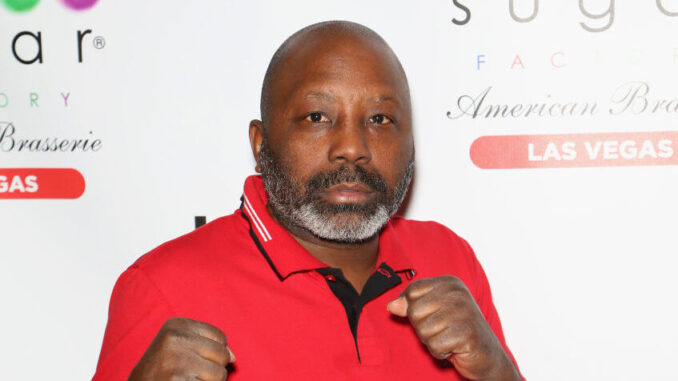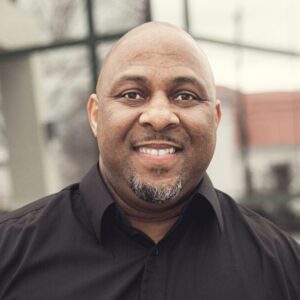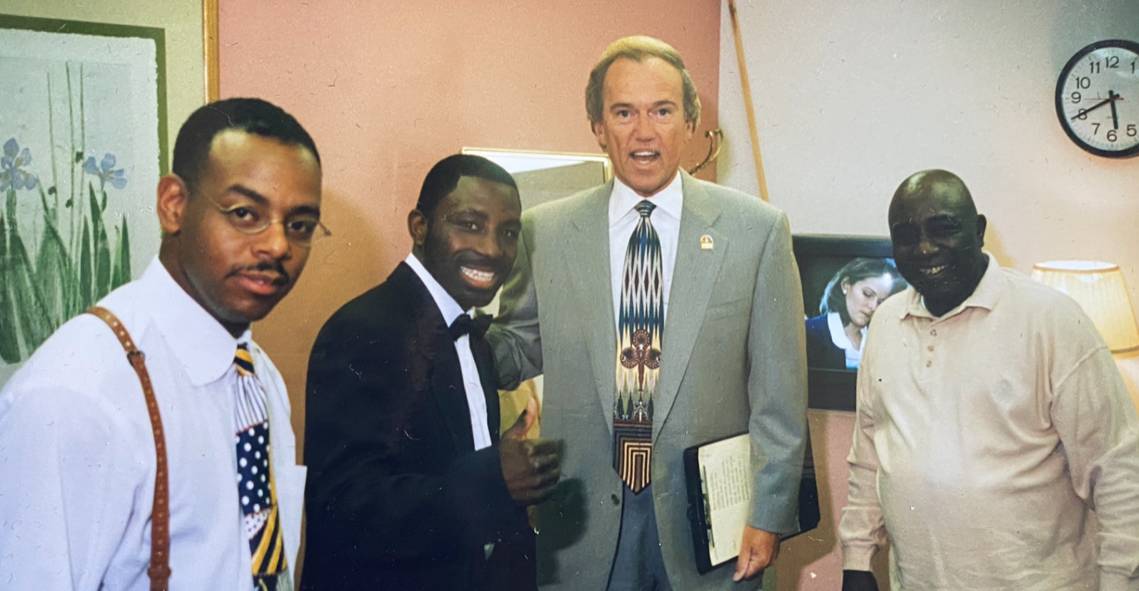
Washington, D.C. native Mark “Too Sharp” Johnson epitomizes Black history during a month when we remember historic African-American figures and their accomplishments.
Johnson achieved greatness inside the boxing ring. He became the first African-American fighter to win a world title at both flyweight (112 pounds) and super flyweight (115 pounds). He capped an illustrious 16-year career with a record of 44 wins and 5 losses, with 28 of those wins coming via knockout.
A slick southpaw known for his elusive style and defensive prowess, Johnson often made opponents miss and he made them pay. Johnson typically pounced on mistakes made by his opponents. He earned his alias “Too Sharp” by wasting few punches and making every shot thrown count.
In 2012, he would reach the pinnacle of the boxing world when he was inducted into the International Boxing Hall of Fame as one of the greatest “little guys” to ever lace up a pair of boxing gloves.
Zenger News caught up with Johnson to discuss his ascension from amateur to pro, why he felt he was blackballed by the sport and why he didn’t feel validated until his Hall of Fame induction.
Percy Crawford interviewed Mark Johnson for Zenger News.
Zenger News: I wanted to go back to your amateur career and how you got started in boxing.
Johnson: I got into boxing… my brother was one of the top flyweights in the world – James Harris. He lost to Paul Gonzalez in the ’84 Olympic Trials, Michael Carbajal in the ’88 Olympic Trials and Eric Griffin in the ’92 Trials. Me and my brother was real tight, even though we were five years apart. That’s what got me into boxing. Coming up at the age of 14 and 15, I won the Junior Olympics twice. In the Junior Olympics, I beat Tim Austin. Both of us had won it the year before, so I beat Tim Austin the second year. At the age of 16, I won the Golden Gloves. I beat Tim Austin and Eric Griffin in ’88 to go to the Olympic Trials. I was the youngest fighter in the Olympic Trials at the age of 15 years old. Me and my brother was at the same weight class, 106 pounds. Both of us got to the semifinals; I lost to Eric Griffin. He tested positive for a banned substance, and they were supposed to reinstate me to fight the winner of my brother and Michael Carbajal. But of course, with the politics of USA Boxing, they said they wasn’t going to give us the opportunity to do it two times. My brother lost to Michael Carbajal, and Carbajal went to the ’88 Trials.

Zenger: Was it difficult to make the decision to go pro, and what made you decide to turn pro when you did?
Johnson: It was a tough decision. When I was rated No. 1 in the world, USA Boxing never called me for the Goodwill Games, never called me for the World Games. … They never called me for nothing. So, I felt like I was being blackballed. As the No.1 guy, they never called me for nothing. I turned pro, and my first fight I beat a guy that I had beat in the amateurs. My second fight, I lost to Richie Wenton from Belfast, Ireland. And Wenton went on to fight Marco Antonio Barrera. But yeah, I lost my second professional fight to Wenton.
Zenger: As a top amateur, to lose your second fight as a pro is unheard of, even though Wenton was a 5-0 fighter at the time. How did you overcome that and become a Hall of Fame fighter?
Johnson: I knew that just getting the right fights at the right time and just building the confidence back up – which is what we have to do with a lot of young fighters now – I knew that would get me right back. Once I got to 10-11 wins in a row, that’s when I was ready to go to the L.A. Forum. My first fight at the L.A. Forum, they didn’t even pay me. I paid my own way to the L.A. Forum. I paid for my own hotel. They didn’t even pay me for the fight. So, I knew that getting on the West Coast was the best thing for me. Also, when I came right back to L.A. for the second fight, I knew they would try to get me beat. I fought the No. 2 contender, Raton Jimenez. He had just lost to Muangchai Kittikasem for the WBC title. And I never went past six rounds. And they thought they were throwing me to the wolves; however, they were throwing him to the wolves. They didn’t know how good I was. I knew if I could just go 12 rounds, then I would be one of the top guys in the weight class.
Zenger: The highlight reels now suggest that you were this elusive defensive wizard – and you were that – but I feel you were so much more than that.
Johnson: I think I was a boxer-puncher. I feel like I could pretty much do everything in the ring. That’s why Cameron Dunkin, when he managed Danny Romero, I was Danny Romero’s No. 1 contender. He made Danny Romero give the belt up. I was Johnny Tapia’s No. 1 contender; he gave the belt up. I was No. 2 in the world in ’93 and didn’t get a title shot till ’96. So, that’s the politics of boxing when it came to Mark Johnson.
Worked with one of the best to ever do it in Mark “Too Sharp” Johnson. pic.twitter.com/8WublXsScp
— Ronnie Duncan (@RonnieSlam) July 15, 2020
Zenger: You are the first African-American flyweight and super flyweight champion in the history of the sport. Did you know that when you were accomplishing those things or was it something you learned after the fact?
Johnson: I knew because I used to spar with Louis “Heidi” Curtis. He fought for the IBF title like two or three times. “Heidi” Curtis had fought Dave McAuley for the IBF title on the same show that I lost to Richie Wenton, so I started doing my homework right then and there. And I said, “You know what, this is what I wanna do!”
Zenger: Why do you think there is a shortage of African-American fighters in those lower divisions that you competed in? Do you think it’s just our bone structure and density or something else?
Johnson: I think our bone structure is different. I think now, we have a lot of great fighters in those lower weight classes, 122 on up. I think they have a lot of great young African-American fighters now. I tell all of ’em, as long as you can box and move, you got a great chance. If you can’t box and move, it’s going to be very difficult.
Zenger: What does it mean to you to have those landmarks of being the first African-American champion in those weight classes?
Johnson: Well, you know, to me, I don’t understand it and I don’t feel it because I’m from a city that don’t respect you for nothing. So, I think once things start to move forward, probably next year when I’m getting stuff into the African American Smithsonian Museum, then people will understand. But right now, with the pandemic going on, everything is messed up. I don’t want to be that guy, that unsung hero where everyone praises me when I’m gone. Praise me now. Not only have I accomplished the things that you mentioned, but I’m also the youngest fighter to go into the International Boxing Hall of Fame. These are accolades that fighters would die to have, and we have had fighters that lost their lives in the ring trying to get ’em. So, I’m very proud of the accomplishments that I have, but like I said, once again, coming from certain towns, certain cities, they don’t respect you for nothing.
Zenger: That’s crazy considering that the DMV is a boxing town. It’s crazy you don’t get the respect you deserve.
Johnson: I mean you gotta understand one thing, you had Sharmba Mitchell, William Joppy, Keith Holmes, [DeMarcus] “Chop Chop” Corley and Mark Johnson, all had world championships at the same time, as small as this city is. Even though Holmes and Joppy were promoted by Don [King], even with “Chop Chop” and Sharmba being promoted by Don, those fights should’ve happened.
Zenger: When you look at Mark “Too Sharp” Johnson’s career, would you say, underrated, underappreciated or do you feel like your time in the light just hasn’t arrived yet to get the credit you deserve?
Johnson: I say underrated, underappreciated. If I would’ve fought Michael Carbajal, if I would’ve fought [Humberto] ‘Chiquita’ Gonzalez when I told ‘Chiquita’ that if he won his fight, we would meet at 110, that I would beat him and I would give him his belts back. And he said he would fight me and that night, he lost to Saman Sorjaturong at the Forum. When Danny Romero and Johnny Tapia fought, I was there. I had a sign in the audience that said, “Can I Play? Can I Get Next?” They made me take the sign down. So, everything that they did to African- American smaller fighters – HBO and Showtime – they didn’t do to Latino fighters and fighters that came from overseas because they knew that African-Americans – we want to get paid for the work that we do. A lot of those guys were just taking pennies on the dollar. At that point in time, I would’ve took pennies on the dollar to get the right fights. I think if I would’ve gotten the right fights, then of course, Mark Johnson would be a household name. I know for a fact I would’ve beat Carbajal. I would’ve beaten all them guys. I tried to fight Scotty Olson. The list goes on and on of the guys that turned me down.
Zenger: How frustrating was that for you?
Johnson: I was very frustrated. It got to the point where I didn’t even want to box anymore. It got to the point where I said I was done with boxing. And just like every other frustrated athlete, sometimes people pick up drugs, sometimes people pick up guns; sometimes people pick up other things. Just so happened that I picked up the bottle. I was able to put the bottle down and get back and win another world title. But I was very frustrated because I knew those guys couldn’t beat me. Floyd Mayweather was No. 1 pound-for-pound, Mark Johnson was No. 2 pound-for-pound and Prince [Naseem] Hamed was No. 3, I was even willing to go up to 126 to fight Hamed. I wanted that fight. I was like, “I’ll fight him.” I went up so far, I wanted to fight Junior Jones. I was calling people out. Before Robert Guerrero and all those guys fought Mayweather, I was calling Robert Guerrero out when he beat a guy from D.C. named Eric Aiken. I was just to the point where I was so frustrated, I was calling everybody out. I was even sending out emails saying I would fight Roy Jones (laughing). I was very frustrated, and that kind of took a toll on me in the boxing ring.

Zenger: What did that induction into the International Boxing Hall of Fame mean to you?
Johnson: Ah man, that’s a feeling that you can never feel again. You’re on a high of a roller-coaster. You’re looking at the big boys. You’re right there with Sugar Ray Leonard who was there, Terry Norris, Roy Jones, all those guys was there. I was finally like, “These guys really do know me.” Even though Roy was on my ’88 Olympic Trials Team, Ray Mercer was on my ’88 Olympic Trials Team, Kevin Kelley was on my ’88 Olympic Trials Team. I think ’88 may have had more medals than anybody. Kennedy McKinney was on that team. Just to see those guys right there congratulating me … I finally felt like I was the President that day. You get on the plane and they wish you in and everybody standing outside with their cameras and they got the rail, I said, “This is how this feels?” I felt very good, man. It was just so great.
Zenger: You were so special in the ring, it’s sad it took that day to make you feel like you belonged.
Johnson: I look at it like, at the end of the day, when you’re dealing with so many different things, and dealing with your career, and you’re trying to work on different things that you’re trying to work on. And you look at these guys who you know that you really can beat, and you see these guys on HBO and Showtime, and you’re saying, “Just give me that opportunity and that chance,” and that opportunity and that chance came when Mark Johnson was not the real Mark Johnson. When I got in there with Rafael Marquez and those guys, I was just Mark Johnson, there was no more “Too Sharp.”
That’s one thing that I can say about Floyd. With the money he had, he was able to go out on his shield with no losses. And that’s the money that he raised because of what he done. A lot of guys like me and other world champions, we’re still not making the money that we should have made. So once again, we need that next fight. We gotta fill that hunger and we miss that spotlight. I think the main thing for me is, I work with a lot of fighters from the DMV. I train fighters, I’m back in the gym. I do my personal training, so I think a lot of that is what keeps me intact. But every world champion, and I don’t care if they say they don’t, if they say they don’t, they are telling a story. Every time you see a good fight come on, you jump up and you say, “I can do this.” Every time you see a good fight, you jump up and you start shadowboxing. I know I jump up and start shadowboxing. It’s like, who can I call and get on one of these Mike Tyson exhibitions (laughing).
(Edited by Stan Chrapowicki and Matthew B. Hall)
The post Fifteen Years After Hanging Up His Gloves, Mark Johnson Still Fighting For Respect appeared first on Zenger News.
